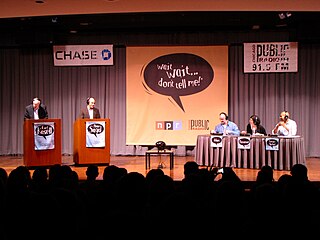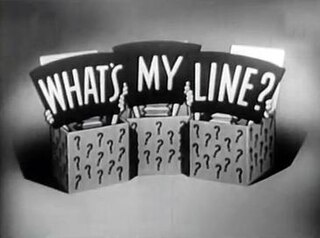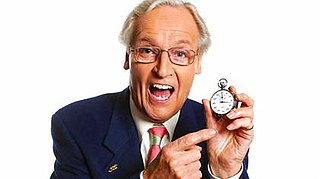| Other names | King Stupid (1998) |
|---|---|
| Genre | Spoof panel game |
| Running time | 30 mins |
| Country of origin | United Kingdom |
| Language(s) | English |
| Home station | BBC Radio 4 |
| Syndicates | BBC Radio 4 Extra |
| Starring | Sue Perkins |
| Written by | |
| Produced by | David Tyler |
| Original release | 22 September 1998 – 29 September 2004 |
| No. of series | 5 |
| No. of episodes | 30 |
| Audio format | Stereo |
| Opening theme | Excerpt from Prince Igor by Alexander Borodin |
| Ending theme | "99 Luftballons" by Nena |
| Website | www |
The 99p Challenge is a spoof panel game originally broadcast on BBC Radio 4. The show is presented by Sue Perkins and features a selection of regular panelists such as Armando Iannucci and regular writers Kevin Cecil, Andy Riley, Jon Holmes and Tony Roche. Panelists are given silly tasks by Perkins (in a manner not dissimilar to those given on I'm Sorry I Haven't A Clue by Humphrey Lyttelton) and are awarded pence for being funny. The player with the most money at the end of the show is given the chance to win 99p. It has been shown in some episodes that the gamble is compulsory, even if the winner has amassed a fortune of more than 99p in the game.
This is the second version of the panel game that was previously transmitted by BBC Radio 4 in 1998 as King Stupid. It was then hosted by William Vandyck and featured much the same line-up of comedians and satirists. The contestants were awarded points instead of pence.
| Episode | Broadcast | Guests |
|---|---|---|
| 1st Series 1998 King Stupid | ||
| 1. 1-1 | 1998-09-22 | Peter Baynham, Simon Pegg, Sue Perkins, Dave Green |
| 2. 1-2 | 1998-09-29 | Peter Baynham, Simon Pegg, Sue Perkins, Dave Green |
| 3. 1-3 | 1998-10-06 | Peter Baynham, Morwenna Banks, Tom Binns, Dave Green |
| 4. 1-4 | 1998-10-13 | Peter Baynham, Simon Pegg, Sue Perkins, Dave Green |
| 5. 1-5 | 1998-10-20 | Peter Baynham, Morwenna Banks, Dave Green, Tom Binns |
| 6. 1-6 | 1998-10-27 | Peter Baynham, Sue Perkins, Simon Pegg, Dave Green |
| 2nd Series 2000 The 99p Challenge | ||
| 7. 2-1 | 2000-06-22 | Simon Pegg, Peter Baynham, Armando Iannucci, Jack Docherty |
| 8. 2-2 | 2000-06-29 | Simon Pegg, Peter Baynham, Richard Herring, David Quantick |
| 9. 2-3 | 2000-07-06 | Simon Pegg, Peter Baynham, Tom Binns, David Schneider |
| 10. 2-4 | 2000-07-13 | Simon Pegg, Peter Baynham, Richard Herring, Mel Giedroyc |
| 11. 2-5 | 2000-07-20 | Simon Pegg, Peter Baynham, Tom Binns, David Schneider |
| 12. 2-6 | 2000-07-27 | Simon Pegg, Peter Baynham, Armando Iannucci, Jack Docherty |
| 3rd Series 2001 | ||
| 13. 3-1 | 2001-07-19 | Armando Iannucci, Simon Pegg, Bill Bailey, Peter Serafinowicz |
| 14. 3-2 | 2001-07-26 | Armando Iannucci, Simon Pegg, Peter Baynham, David Quantick |
| 15. 3-3 | 2001-08-02 | Armando Iannucci, Simon Pegg, Nick Frost, Ben Moor |
| 16. 3-4 | 2001-08-09 | Peter Serafinowicz, Tom Binns, Nick Frost, Marcus Brigstocke |
| 17. 3-5 | 2001-08-16 | Armando Iannucci, Simon Pegg, Nick Frost, Peter Baynham |
| 18. 3-6 | 2001-08-23 | Peter Serafinowicz, Tom Binns, Nick Frost, Ben Moor |
| 4th Series 2003 | ||
| 19. 4-1 | 2003-02-04 | Armando Iannucci, Simon Pegg, David Quantick, Bill Bailey |
| 20. 4-2 | 2003-02-11 | Armando Iannucci, Simon Pegg, Peter Serafinowicz, Marcus Brigstocke |
| 21. 4-3 | 2003-02-18 | Armando Iannucci, Simon Pegg, Peter Serafinowicz, Jon Holmes |
| 22. 4-4 | 2003-02-25 | Armando Iannucci, Peter Baynham, Marcus Brigstocke, Nick Frost |
| 23. 4-5 | 2003-03-04 | Armando Iannucci, Peter Baynham, Jack Docherty, Sean Lock |
| 24. 4-6 | 2003-03-11 | Armando Iannucci, Simon Pegg, Marcus Brigstocke, Jon Holmes |
| 5th Series 2004 | ||
| 25. 5-1 | 2004-08-25 | Armando Iannucci, Peter Baynham, Simon Pegg, Jon Holmes |
| 26. 5-2 | 2004-09-01 | Armando Iannucci, Peter Serafinowicz, Miranda Hart, Rob Rouse |
| 27. 5-3 | 2004-09-08 | Armando Iannucci, Peter Baynham, Simon Pegg, Dan Antopolski |
| 28. 5-4 | 2004-09-15 | Armando Iannucci, Rob Rouse, Jon Holmes, Marcus Brigstocke |
| 29. 5-5 | 2004-09-22 | Armando Iannucci, Nick Frost, Marcus Brigstocke, Miranda Hart |
| 30. 5-6 | 2004-09-29 | Armando Iannucci, Nick Frost, Rob Rouse, Peter Serafinowicz |
Series of the show continue to be repeated on BBC Radio 4 Extra.
The show's theme is an excerpt from Alexander Borodin's opera Prince Igor . The show ends with Nena's "99 Luftballons". After the panellists are introduced, a brief snippet of Carl Orff's O Fortuna from Carmina Burana is played.

Match Game is an American television panel game show that premiered on NBC in 1962 and has been revived several times over the course of the last six decades. The game features contestants trying to match answers given by celebrity panelists to fill-in-the-blank questions. Beginning with the CBS run of the 1970s, the questions are often formed as humorous double entendres.

A panel show or panel game is a radio or television game show in which a panel of celebrities participate. Celebrity panelists may compete with each other, such as on The News Quiz; facilitate play by non-celebrity contestants, such as on Match Game and Blankety Blank; or do both, such as on Wait Wait Don't Tell Me. The genre can be traced to 1938, when Information Please debuted on U.S. radio. The earliest known television panel show is Play the Game, a charades show in 1946. The modern trend of comedy panel shows can find early roots with Stop Me If You've Heard This One in 1939 and Can You Top This? in 1940. While panel shows were more popular in the past in the U.S., they are still very common in the United Kingdom.

Geoffrey Howard Perkins was a British comedy producer, writer and performer. He was BBC head of comedy between 1995 and 2001, and produced the first two radio series of The Hitchhiker's Guide to the Galaxy. He is one of the people credited with creating the panel game Mornington Crescent for I'm Sorry I Haven't a Clue. In December 2008 he posthumously received an Outstanding Contribution to Comedy Award.

Says You! is a word game quiz show that airs weekly in the United States on public radio stations. Richard Sher created the show in 1996 with the guiding philosophy: "It's not important to KNOW the answers: it's important to LIKE the answers." The first episode to broadcast on radio took place in Cambridge, Massachusetts in February 1997.
To Tell the Truth is an American television panel show. Four celebrity panelists are presented with three contestants and must identify which is the "central character" whose unusual occupation or experience has been read aloud by the show's host. When the panelists question the contestants, the two impostors may lie whereas the "central character" must tell the truth. The setup adds the impostor element to the format of What's My Line? and I've Got a Secret.

What's My Line? is a panel game show that originally ran in the United States, between 1950 and 1967, on CBS. The game show started in black and white and later in color, with subsequent U.S. revivals. The game uses celebrity panelists to question contestants in order to determine their occupation. The majority of the contestants were from the general public, but there was one weekly celebrity "mystery guest" for whom the panelists were blindfolded. It is on the list of longest-running U.S. primetime network television game-shows. Originally moderated by John Charles Daly and most frequently with regular panelists Dorothy Kilgallen, Arlene Francis, and Bennett Cerf, What's My Line? won three Emmy Awards for "Best Quiz or Audience Participation Show" in 1952, 1953, and 1958 and the Golden Globe Awards for Best TV Show in 1962.
Twenty questions is a spoken parlor game which encourages deductive reasoning and creativity. It originated in the United States and was played widely in the 19th century. It escalated in popularity during the late 1940s, when it became the format for a successful weekly radio quiz program.
Susan Elizabeth Perkins is an English actress, broadcaster, comedian, presenter and writer. Originally coming to prominence through her comedy partnership with Mel Giedroyc in Mel and Sue, she progressed into radio and television presenting, notably of The Great British Bake Off (2010–2016), Insert Name Here (2016–2019) and Just a Minute on BBC Radio 4.

I've Got a Secret is an American panel game show produced by Mark Goodson and Bill Todman for CBS television. Created by comedy writers Allan Sherman and Howard Merrill, it was a derivative of Goodson–Todman's own panel show, What's My Line?. Instead of celebrity panelists trying to determine a contestant's occupation, however, as in What's My Line, the panel tried to determine a contestant's secret: something that is unusual, amazing, embarrassing, or humorous about that person.

Melanie Clare Sophie Giedroyc is an English actress, comedian and television presenter.
Mel Giedroyc and Sue Perkins, known collectively as Mel and Sue, are an English comedy double act. They are known for hosting the BAFTA Award-winning BBC One cookery series The Great British Bake Off. Previously, they hosted the lunchtime chat shows Light Lunch and Late Lunch on Channel 4.

The Name's the Same is an American game show produced by Goodson-Todman for the ABC television network from December 5, 1951 to August 31, 1954, followed by a run from October 25, 1954 to October 7, 1955. The premise was for contestants to guess the names of persons whose actual name corresponded to a famous person, celebrity, a place, common object or action.

Sweat the Small Stuff is a British comedy panel show broadcast on BBC Three, presented by Nick Grimshaw and featuring team captains Melvin Odoom and Rochelle Humes. Humes, formerly a regular panellist, replaced Rickie Haywood Williams, who was a team captain in series 1.
The Next Line was a 1990s television game show. Produced by Blair Murdoch, it was filmed at the studios of U.TV in Vancouver, British Columbia. Hosted by Kevin Frank, with Kathy Morse as the announcer, it centered on viewing classic movie clips that were cut off at a point and then determining which of a panel of "experts" gave the correct line that followed. It premiered in 1991 on many Global Television Network stations, running for 13 weeks. Reruns were first aired on Prime Network in the late 90s, and later resurfaced on GameTV.
Musical Chairs is an American primetime panel game show that ran from July 9 to September 17, 1955 on NBC. The host was Bill Leyden and the show featured voice actor Mel Blanc, composer Johnny Mercer, and orchestra leader Bobby Troup as regular panelists.
Love Me, Love Me Not is a Canadian game show based on the Italian game show, M'ama non m'ama, which in English means "love me, love me not". Both shows were created by Steve Carlin, the producer of The $64,000 Question in the 1950s. In 1988 there was a British version of the show, with the same name.
Down You Go is an American television game show originally broadcast on the DuMont Television Network. The Emmy Award-nominated series ran from 1951 to 1956 as a prime time series primarily hosted by Dr. Bergen Evans. The program aired in eleven different timeslots during its five-year run.

William Vandyck is an actor, writer and ex-barrister.

Just a Minute is a BBC Radio 4 radio comedy panel game. For more than 50 years, with a few exceptions, it was hosted by Nicholas Parsons. Following Parsons' death in 2020, Sue Perkins became the permanent host, starting with the 87th series. Just a Minute was first transmitted on Radio 4 on 22 December 1967, three months after the station's launch. The programme won a Gold Sony Radio Academy Award in 2003.

På minuten is a Swedish radio panel game similar to the BBC's Just a Minute. Recorded before a live audience, it is broadcast on Sveriges Radio P1 on Saturdays at 16.03, with a repeat the following day at 18.00. The recordings are made at Sveriges Radio, or sometimes at Stockholm City Theatre's Soppteater (café-theatre).